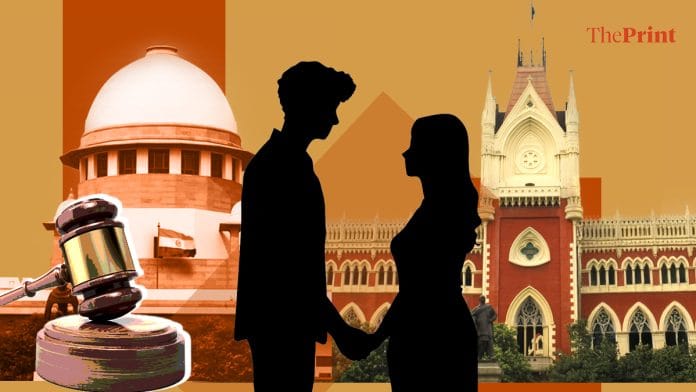New Delhi: “How can you criminalise love?” asked the Supreme Court Tuesday, as it sought to back the Tamil Nadu government’s more than two-year-old circular, asking its police officers, investigating POCSO cases, not to make hasty arrests in “romantic cases”.
“This circular is meant for genuine romantic cases where the boy and the girl want to get married. Why are you questioning it?” a bench led by Justice B.V. Nagarathna asked senior advocate H.S. Phoolka, who on behalf of child-rights organisation Bachpan Bachao Aandolan (BBA), has raised doubts over the state circular and sought its quashing. In a petition filed before the Supreme Court, BBA has claimed that such circulars create ambiguities while dealing with cases of sexual abuse of victims between 16 and 18 years.
The top court, in August 2023, had issued a notice to the TN government, the National Commission for Protection of Child Rights (NCPCR) and the Union Ministry of Women and Child Development on BBA’s public interest litigation (PIL).
But the bench disagreed with BBA’s line of argument and told Phoolka that the circular is meant for cases involving teenagers and others who are on the verge of majority and running away to get married. “Let’s face the harsh reality. These cases cannot be treated as criminal,” the bench maintained.
In a related matter, the court disallowed NCPCR and National Commission for Women (NCW) from appealing against a 2022 judgement of the Punjab and Haryana High Court, which held that a 16-year-old Muslim girl can enter into a valid marriage with a Muslim man and granted protection to the couple from threats.
The bench observed that the two central government bodies were strangers to the litigation and lacked jurisdiction to challenge the HC judgement. It also dismissed three more petitions filed by NCPCR challenging similar orders passed by other high courts.
“We fail to see how the NCPCR can be aggrieved by such an order. If the high court, in exercise of its power under Article 226 seeks to extend protection to two individuals, the NCPCR has no locus standi to challenge such an order. Dismissed,” the bench ordered, while expressing surprise that the organisation, whose role is to protect children, is challenging orders that secure the life and liberty of minors.
NCPCR’s appeal was part of a set of petitions that oppose POCSO’s non-applicability in mutually romantic cases. While NCPCR assailed the HC orders that quashed POCSO cases where the boy and girl, bordering adulthood, engaged in consensual physical activity, BBA objected to TN government’s December 2023 circular, claiming there cannot be a blanket direction to go slow in POCSO cases.
During the hearing Tuesday, Justice Nagarathna’s bench rejected NCPCR’s challenge and showed reluctance in accepting BBA’s argument. The court’s concern over the manner in which mutual romance between adolescents is being criminalised under POCSO comes at a time when another bench of the top court is deliberating on whether the age of consent under the special law meant to prevent child sexual abuse should be reduced from 18 to 16. This case, titled as Nipun Saxena versus Union of India, is listed for hearing Wednesday.
BBA’s counsel Phoolka told the court that the TN circular was based on the dissemination of incorrect data by various NGOs and governments, claiming majority of cases under POCSO were of adolescent couples in romantic relationships.
Justice Nagarathna, however, found no merit in the argument and said: “Each case (under POCSO) is different. Here (the circular) is meant to protect mutual cases. Love is not penal. Don’t read such cases the same as criminal cases. Keep the reality of society in mind. People are not in only girls or boys in school. They are now in co-education universities and have the freedom to have education. They develop feelings for each other, how can you say it is criminal to love?”
The bench said it is necessary to draw a distinction between the two categories of cases being registered under POCSO. In consensual cases, it pointed out, the girl goes through severe trauma when she is separated from the boy whom she loves.
“Parents of the girl file criminal cases to cover up the elopement of the daughter. If the daughter loves a man and elopes, how is it a crime?” the bench asked Phoolka.
It adjourned the hearing to next week when Phoolka sought a direction to all states to complete POCSO trials within the stipulated time period that is mentioned in the special law—one year.
(Edited by Viny Mishra)
Also read: POCSO vs teen romance: As SC reviews age of consent, NCRB data shows 9 out of 10 youth get acquitted






